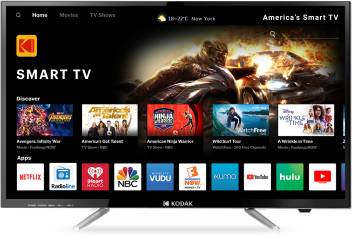With the rise of smart TVs, the entire world has been made accessible to us, and vice versa! It has also given rise to many suspicions within Smart TV users and potential buyers of the devices’ safety and risks. Therefore, we have decided to put forward a guide that can help you decode the challenges, and if required, ways to face them.
But first, the basics!

What Are Smart TVs?
As opposed to the regular or “dumb” TVs whose only job was to receive a signal from a cable, HDTV antenna, or other A/V sources and display the content—smart TVs pushed the envelope and brought in many interesting features and viewing options, with or without the internet. And you’re like, they’re very similar to our smartphones and other smart home devices. Like the idea? You can find out the best LED TV here.
By this we mean you can connect these Smart TVs to the world of the internet, and make online streaming services and platforms, the likes of Netflix, Hulu, and Youtube accessible to you. You can even check your social media on these TVs, as well as connect smart gadgets and appliances around your house with the help of Alexa!
Many of the newer smart TVs have voice recognition tools integrated into their systems, like Amazon Alexa, or even Google Assistance. This can help you switch the channels, slide through different programs, and more! Some of these TVs will also allow you Bluetooth connectivity, so it’s easier to connect your Bluetooth speakers and start a party!
These smart TVs can also allow you to use the smart home features. They can get connected to devices like smart lights, smart locks, and others back home. Some might even come with a dashboard dedicated to controlling all of these devices seamlessly! So, overall, smart TVs have brought a pool of opportunities for us to explore around.
Is It Possible To Hack Smart TVs?
We have all heard about Webcam hacking, and how it has illegally authorized outsides to spy into your space. Most of these hacking incidents end up at blackmail. But if you believe this is an issue limited to computers, then you might want to think again! As we see the rise of Smart TVs, the Webcam infiltration is now heading into our living room TV.

And this isn’t only about anyone catching you in a private moment, a hacker is capable of manipulating the webcam within your TV and exploring the possibilities of stealing anything valuable in your home! Yes, like a potential robbery! Other incidents that can prop up are hackers messing around with your volume and surfing remotely. They could also end up opening disturbing or explicit content through the inbuilt browser on your TV. This can be done easily by downloading a harmful code.
Don’t believe you’re going to be safe if you do not have a webcam instilled in your TV. The company providing you with the content service might be tracking your entire browsing history constantly. Most of this tracking hides under the blanket of harmless “advertising”, attempting to offer you the best service. But this is certainly an aspect of the smart TV you need to make sure you’re comfortable with.
Similar to other smart devices, Smart TVs are constantly updating for the better. Manufacturers are making sure they keep their software up to date to minimize inconvenience to customers and maximizing their satisfaction. However, in this entire rush of getting the best new product out on the market, some security might be compromised.
Is There A Way To Make Smart TVs Secure?
Yes, your smart TV can be hacked! But that does not mean there is no way to prevent that from happening. Here are a couple of tips you can follow to secure your network as much as possible:
Make accounts secure!
Before anything else, make sure to keep the user accounts on your TVs in-app profiles that are secure by any strict sign-in requirement. This will help you lay down the first and most important layer of security. Here are some ways you can do that:
- You can start by setting up a 2FA or two-factor authentication system on as many apps and services as possible. However, if you find this to be unable, you need to make sure to increase the security through passwords, PINs, or even biometric sign-ins!
- Make sure to keep all types of financial or personal information out and away from your TVs as much as you can.
- Create another profile with its unique sign-in information along with restrictions on usage.
- Do not share the password or any login information to the master accounts of your smart TV.
Update your apps
Through different models and even manufacturers, the entire process of installing the system updates is going to vary. Therefore, always check the user guide of the particular model if you need any further information. Whenever you have the chance, make sure to choose the auto-update option, so you do not forget to upgrade your system throughout the year.
Putting off on any update can expose you to threats and vulnerabilities that have been fixed in the newer or updated version. Therefore, never miss out on updates even if they are manual.
Turn off or disable the TV mic & camera
As you must have already guessed, these two features in your smart TV are susceptible to getting hacked and exploited the most. Considering the worst-case scenario, your personal information could be collected to infiltrate in your account easily!
Can You Stop Your Smart TV From Tracking You?
Yes! But to do this, you will be required to shut out or disable your TV’s camera and mic features. There are simple steps you can perform to achieve this! Just hop to the settings, or your user manual to get further information on how to do it on your particular device. If nothing else works out, the FBI has suggested taping up the camera with black tape—this could be a nifty tip even if you have disabled the camera through settings.
Also, make sure to stick to the remote controls provided along with the TV, instead of opting for smartphone remote apps. This can make it easier for hackers to grab your personal information.
You can also dodge the hackers if you make it certain to secure your home networks. This can include synching devices like smart televisions, WiFi router, and even other smart devices.

Cyber Security Researcher. Information security specialist, currently working as risk infrastructure specialist & investigator. He is a cyber-security researcher with over 25 years of experience. He has served with the Intelligence Agency as a Senior Intelligence Officer. He has also worked with Google and Citrix in development of cyber security solutions. He has aided the government and many federal agencies in thwarting many cyber crimes. He has been writing for us in his free time since last 5 years.











